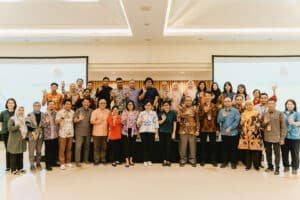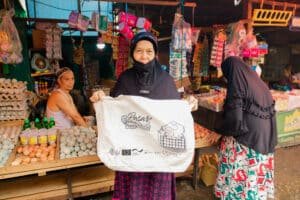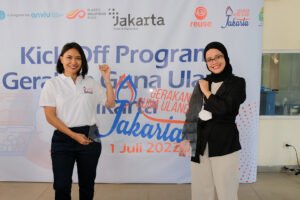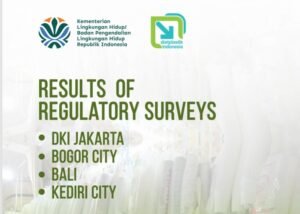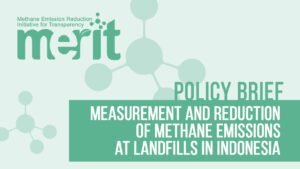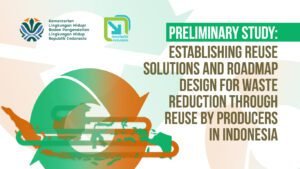Tuesday, February 28, 2023. The Indonesian Plastic Bag Diet Movement and the Bali Environmental Education Center (PPLH) held a Plastic Free Market workshop as a form of support for Bali Governor Regulation Number 97 of 2018 concerning Limiting the Generation of Single-Use Plastic Waste. The Bali Provincial, City, and Regency Governments and heads of traditional markets throughout Bali Province attended the workshop.
To implement Bali Governor Regulation Number 97 of 2018, we work together to realize a single-use, plastic-free Bali from waste generation originating from traditional markets.
“I appreciate my friends from PPLH Bali and GIDKP for helping us facilitate this activity. We still experience many limitations within the internal agencies in Bali Province. For example, inviting people not to use single-use plastics in traditional markets is difficult. Therefore, we collaborate with friends from NGOs, market heads, and traditional heads to contribute to the success of Pergub 97 of 2018 through this Plastic Free Market Program”. I Made Teja Head of the Bali Provincial Forestry and Environment Service.
In Bali, public enthusiasm for supporting the Plastic Free Market Program is very high. Adding a market location as a pilot project at Guwang Art Market, Sukawati, proves this.
“In 2021, we started the Plastic Free Market Program at Sindu Sanur Market, which then succeeded in creating a trend of reducing single-use plastic in that market. “Seeing the extraordinary achievements of Sindu Sanur Market, we are trying to replicate the same program at Guwang Art Market, which is also one of the tourist destinations for tourists.” Said Rahyang Nusantara, Deputy Director of the Indonesian Plastic Bag Diet Movement.
“We also want to engage more with traders, managers, and consumers in traditional markets. Therefore, we discussed a lot with them to discover how their interactions and experiences were to remind consumers to bring reusable bags from home. “Through activities like this workshop, I hope we all find answers to the difficulties experienced in creating traditional markets free of single-use plastic.” Rahyang continued.
Bali Province Governor Regulation No. 97 of 2018 was implemented for almost five years, but the results still needed to be more optimal. Through this Plastic Free Market Program, these regulations will be maximized and also become more perfect.
“Based on research from the Indonesian Zero Waste Alliance in 2020, which stated that after two years of implementing the Bali Province Governor’s Regulation No. 97, this was indeed not optimal. This is because traditional markets were not focused at that time. One of the sources of plastic waste in Bali also comes from traditional markets. “Therefore, we are pioneering the Plastic Free Market Program in Bali with the hope that the regulations made will have more impact.” Catur Yudha as Director of PPLH Bali.
In the future, through the Plastic Free Market Program, Bali will continue to work together to realize its ambition to create a plastic waste-free Bali.
“In the future, we will continue to educate all residents. “We will provide reusable bags to make the plastic-free market a success, as well as Governor Regulation 97 of 2018. Of course, we will need all parties to realize the dreams we built together.” – said I Ketut Karben Wardana, the traditional village head in the Guwang Art Market area.
About Plastic Free Market
A plastic-free pilot market trial program which is a collaboration between the Indonesian Plastic Bag Diet Movement (GIDKP) and traditional market managers in the regions (Jakarta, Bandung, Banjarmasin, Bogor, Surabaya, Denpasar and Gianyar). This activity started in December 2019 at West Tebet Market, Jakarta. The main activities of this program are (1) standard operational procedure training, training on plastic-free transaction procedures between traders and consumers; (2) focus group discussions, traders, city government, local communities and traditional market managers discuss to find alternative ideas and solutions to make the plastic-free market program a success in each region; (3) plastic robbery, a form of education provided to consumers by exchanging used plastic bags for reusable bags; (4) plastic consumption research, calculating the decrease or increase in single-use plastic consumption as the program runs; and (5) program publication, disseminating program information to consumers and the broader community around the pilot market area through social media, talk shows, press conferences and installing visual materials in the market area.
About GIDKP
The Indonesian Plastic Bag Diet Movement (GIDKP) is a non-profit organization incorporated as an association that has received various awards for its efforts to realize a single-use plastic-free Indonesia. By taking an advocacy, collaboration, and education approach, GIDKP has succeeded in encouraging more than 70 cities/districts to ban single-use plastics. GIDKP initiated the “Not Free Plastic Bags” (#Pay4Plastic) trial in 2016 throughout Indonesia with the Ministry of Environment and Forestry, which reduced plastic bag consumption by up to 55%. GIDKP has received various awards, including the Mental Revolution Award from the Indonesian Government (2019) and the UN Ocean Hero 2018 appreciation from the UN. GIDKP’s activities were also covered in two documentary films, The Story of Plastic (2019), which won the Emmy Awards, and Pulau Plastik (2021).
About PPLH Bali
The Bali Environmental Education Center, or PPLH Bali, is a non-governmental organization (NGO) that was founded in 1997. PPLH Bali is a legal entity in the form of a foundation. PPLH Bali is committed to fighting for the rights of natural resources and local culture in sustainable management to fulfill the human rights of the community and future generations to a healthy environment, a revitalizing economy, social equality, and justice for today, tomorrow, and in the future. Currently, PPLH Bali is focusing on the Environmental Education (EE) program, ZWC (Zero Waste Cities), FSC (Food Smart City), The Big 5 Tire Program (BTB5), PSP (Disposable Plastic) Free Market, Renewable energy, Water and Forest Conservation, and Marine Program.


